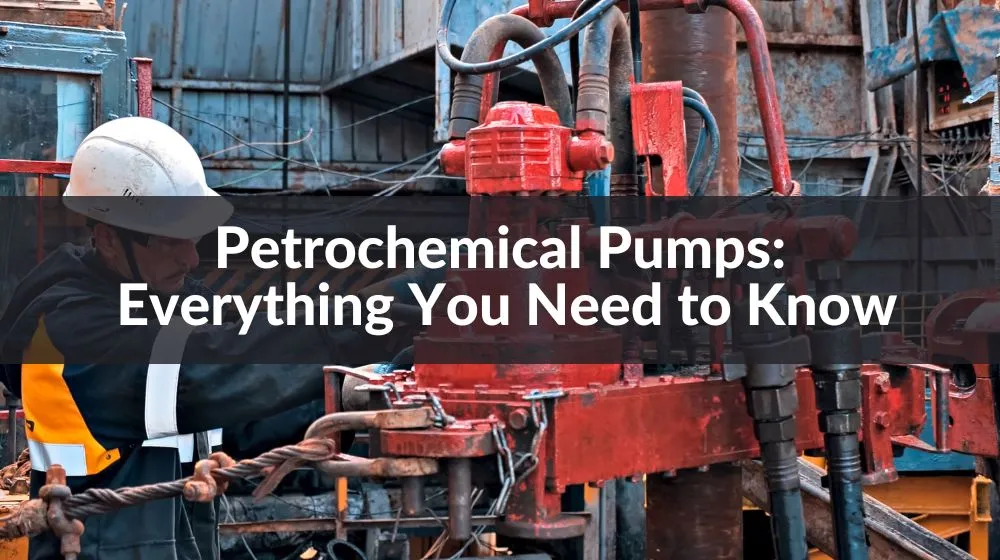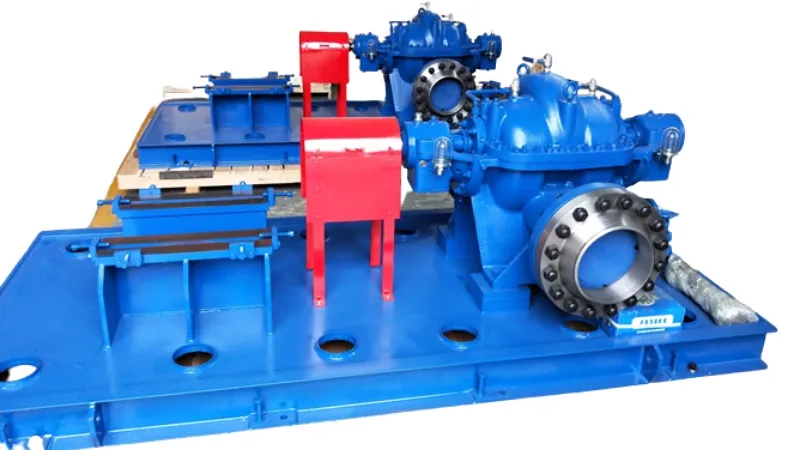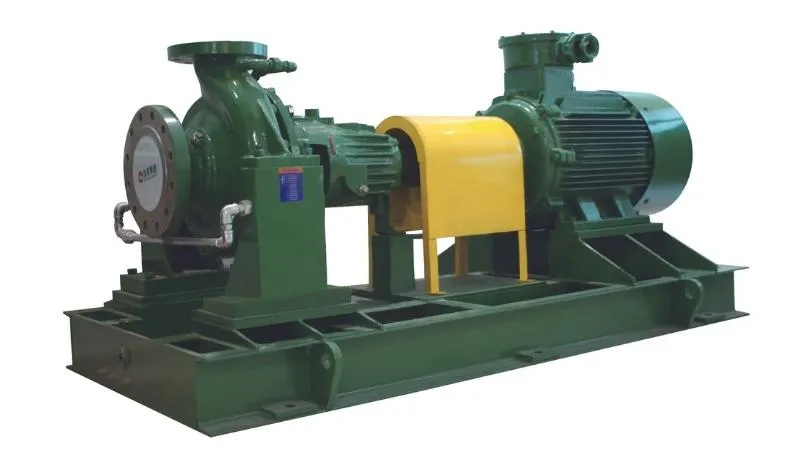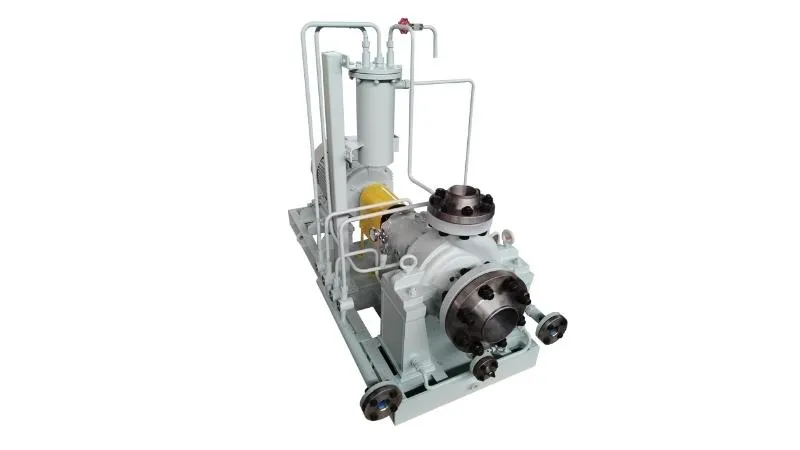


In the petrochemical industry, pumps are a vital piece of equipment. They play a key role in various stages and processes, from the transportation of crude oil to all aspects of chemical production. With its high efficiency and reliable performance, petrochemical pumps provide necessary liquid and gas delivery solutions for petrochemical processes. Let's take a closer look at this important industrial equipment.
A petrochemical pump is a mechanical device used to transport and process liquids and gases in the petrochemical industry. They are widely used in refineries, chemical plants, oil storage and transportation and natural gas processing and other fields. Petrochemical pumps use mechanical energy to convert energy into fluid kinetic energy, thereby transporting liquids or gases from one place to another, or compressing, lifting or mixing them.
The design and manufacture of petrochemical pumps need to take into account the characteristics of liquids or gases, such as viscosity, temperature, pressure and chemical properties. These pumps are usually made of corrosion-resistant materials to meet the requirements of petrochemical fluids and to ensure pump reliability and long-term stability.
There are various types of petrochemical pumps, including centrifugal pumps, reciprocating pumps, axial flow pumps, mixed flow pumps, and screw pumps. Each type of pump has its applicable working conditions and specific working principles. Petrochemical pumps play a vital role in the petrochemical production process, they enable the petrochemical industry to handle, transport and process liquids and gases efficiently and safely.
Petrochemical pumps are of irreplaceable importance in the petrochemical industry. They ensure the smooth progress of petrochemical production , specifically from the following aspects:
Conveying and processing liquids and gases: petrochemical pumps are used to transport and process liquids and gases in the petrochemical industry, including crude oil, refined products, chemical raw materials, chemical products, liquefied natural gas, etc. They are able to transfer these media from one place to another to meet the conveying needs in industrial production process.
Provide process power: petrochemical pumps provide power support for process processes by converting mechanical energy into fluid kinetic energy. They can pressurize, lift or mix liquid or gas to meet different process requirements in petrochemical production, such as booster pumps for pipeline transportation, circulation pumps for cooling systems, etc.
Maintain fluid circulation and balance: In many petrochemical processes, it is necessary to maintain fluid circulation and balance to ensure production stability and efficiency. Petrochemical pumps can promote the circulation of fluid in the system, ensure the balance and flow of fluid between different equipment, and prevent blockage and accumulation.
Support industrial production operation: The reliable operation of petrochemical pumps is crucial to the normal operation of industrial production. They ensure the smooth progress of raw material supply, process control, product delivery and other links. The performance stability and reliability of the pump directly affect the production efficiency and safety.
Guarantee product quality and safety: petrochemical pumps play a key role in the production process of oil refining and chemical industry, and have a direct impact on product quality and safety. Reasonable selection of pump selection, design and operating conditions can ensure product stability, purity and compliance with standard requirements, while reducing the risk of leakage and accidents.
The performance parameters of the pump, such as flow rate, head, efficiency, etc., as well as factors such as pump structure, impeller design and material selection, will also affect the working principle and performance of petrochemical pumps. The following is the basic working principle of petrochemical pumps:
Suction process: When the pump starts to work, the pump's impeller (also known as the rotor) starts to rotate. As the impeller rotates, the pressure at the suction of the pump decreases, creating a negative pressure area. This allows liquid or gas to enter the suction line of the pump.
Induction process: The liquid or gas entering the pump enters the chamber of the pump through the suction pipe, usually due to the centrifugal force or thrust generated by the rotation of the impeller. The impeller is designed so that the liquid or gas is pushed towards the outlet of the pump.
Compression process: In the pump chamber, the liquid or gas is compressed with the rotation of the impeller. This causes the liquid or gas to increase in pressure, allowing it to overcome resistance in the pipe or system and propel it forward.
Discharge process: The compressed liquid or gas is discharged through the outlet pipe of the pump and supplied to the place where it is needed, such as a processing device, a storage container or the next stage of the process.
Application fields: petrochemical pumps are mainly used in petrochemical industry, including oil refining, chemical industry, natural gas processing and other fields. While other centrifugal pump types are suitable for a variety of different industries and applications such as water supply, drainage, agricultural irrigation, etc.
Fluid characteristics: Petrochemical pumps need to handle special fluids such as corrosive, high temperature, and high pressure, so their design and material selection are more stringent. Other centrifugal pump types may not have to deal with such stringent fluid property requirements.
Material selection: Petrochemical pumps usually use corrosion-resistant materials, such as stainless steel, nickel-based alloys, polymers, etc., to resist the corrosion of liquids or gases. Material selection for other centrifugal pump types can vary depending on the specific application.
Design parameters: The design parameters of petrochemical pumps usually take into account the requirements of special working conditions such as high temperature, high pressure, and high viscosity. Design parameters for other centrifugal pump types may focus more on general performance requirements such as flow and head.
Safety requirements: Due to the high risk of petrochemical liquids and gases, petrochemical pumps need to meet higher safety requirements in design and operation. They may need to be equipped with special safety devices, leak detection systems, etc. to ensure the safety of operators and equipment.
Petrochemical pumps have the following advantages:
Corrosion resistance: Petrochemical pumps are usually made of corrosion-resistant materials and can handle corrosive liquids and gases, such as acids, alkalis, organic solvents, etc. This allows them to operate safely and reliably in the petrochemical industry and have a long service life.
High-temperature performance: petrochemical pumps can handle high-temperature fluids, and their design and material selection take into account factors such as thermal expansion and thermal stress under high-temperature conditions. This makes them suitable for applications requiring handling of high temperature media in petrochemical processes, such as oil refining, chemical production, etc.
High pressure capability: Petrochemical pumps usually have high head and pressure capabilities, which can push liquid or gas to a long distance or high place. This enables them to meet the requirements of long-distance transportation and high-pressure processes in petrochemical production processes, ensuring smooth flow of fluids.
Diversified models and specifications: petrochemical pumps provide a variety of models and specifications to meet different application requirements. Whether it is a small submersible pump or a large centrifugal pump, petrochemical pumps can provide the appropriate solution according to specific needs.
Reliability and stability: Petrochemical pumps are designed and manufactured in compliance with strict standards and specifications to ensure their reliability and stability. They have undergone strict testing and quality control, and can operate stably in harsh working environments, reducing failures and downtime.
Ease of maintenance: petrochemical pumps are relatively simple to maintain and easy to carry out routine maintenance and overhaul. Its structural design makes it relatively easy to clean, repair and replace parts, reducing the time and cost of the maintenance process.
Run:
Maintain:
Equipment safety: ensure that the design, manufacture and installation of petrochemical pumps comply with relevant safety standards and specifications. The pump should undergo strict testing and quality control to ensure its reliable performance, and be equipped with necessary safety devices, such as leak detectors, over-temperature protection devices, etc.
Operational safety: Operators should receive necessary training and be familiar with the operation and safety procedures of petrochemical pumps. They should follow the correct operating procedures and strictly follow the relevant safety operating procedures to minimize the risk of accidents and injuries.
Leakage control: Petrochemical pumps may leak during operation, especially in the sealing part. To control leakage, high-quality seals should be used, with regular inspection and maintenance. In addition, measures should be taken to capture and treat spills to prevent them from polluting the environment.
Waste disposal: Liquids and gases handled by petrochemical pumps may contain hazardous substances. When dealing with waste liquid and waste gas, relevant environmental laws and regulations should be followed, and appropriate waste treatment measures, such as separation, filtration, neutralization, reuse, etc., should be taken to minimize the adverse impact on the environment.
Environmental monitoring: regularly monitor and evaluate the water quality, air quality and noise level of the environment where petrochemical pumps are located. This helps to detect and solve potential environmental problems in a timely manner, and take necessary measures to protect the surrounding ecosystem and human health.
Regulatory compliance: Comply with relevant laws, regulations and standards, such as safety production law, environmental protection law, etc. Ensure that the design, operation and maintenance of petrochemical pumps comply with national and regional requirements, and participate in relevant safety audits and supervision.
Oil refining process: petrochemical pumps are used in various stages of the oil refining process, including crude oil transportation, storage and processing, mixing, separation, cracking, desulfurization, desalination, etc. They are used to transport media such as crude oil, fuel oil, lubricating oil to different processing units and equipment.
Chemical production: petrochemical pumps are used for the transportation, circulation and treatment of liquids and gases in the chemical production process. For example, in a chemical reactor, pumps can deliver reactants into the reactor and products to subsequent processing units.
Natural Gas Processing: Petrochemical pumps are also used in natural gas processing. They are used for the compression of natural gas, the liquefaction and transportation of gas, and the storage and distribution of liquefied natural gas (LNG), among others.
Petrochemical equipment: Petrochemical pumps are used for the transportation and treatment of liquids and gases in various petrochemical equipment, such as polymerization reactors, distillation towers, adsorption towers, extraction towers, crystallizers, etc.
Environmental protection facilities: In the environmental protection facilities of the petrochemical industry, petrochemical pumps are used for wastewater treatment, waste gas treatment and waste treatment, etc. They help send wastewater and exhaust air to treatment facilities and ensure the safe collection and disposal of waste.
Water supply and drainage systems: In addition to the above applications in petrochemical processes, petrochemical pumps are also used in water supply and drainage systems. For example, they can be used to provide water supply for factories, treat sewage and discharge waste water, etc.
Choosing the right petrochemical pump manufacturer is a key step to ensure high-quality products and services. Here are a few key considerations for selecting the right petrochemical pump manufacturer:
Vendor Reputation and Experience: Consider the vendor's reputation and experience. Choose manufacturers with good reputation and rich experience in the petrochemical industry, they can provide reliable products and technical support.
Quality standards and certification: Ensure that the manufacturer's products meet international quality standards and certification requirements, such as ISO certification. This shows that manufacturers have certain standards and processes in product design, manufacturing and quality control.
Technical capability and innovation capability: Evaluate the manufacturer's technical capability and innovation capability. A manufacturer with technical expertise and innovative ability to provide advanced products and solutions to meet the changing needs of petrochemicals.
Product range and applicability: Consider the vendor's product range and applicability. Make sure that the products they provide can meet your specific needs, including flow, head, media characteristics and so on.
Technical support and after-sales service: attach importance to the manufacturer's technical support and after-sales service. Make sure they can provide timely technical consultation, training and maintenance services to ensure the normal operation and troubleshooting of equipment.
Cost-effectiveness: comprehensively consider product price, performance and quality, and look for manufacturers with good cost performance. Not only look at the price, but also consider the long-term operating costs and equipment life.
Reference and Evaluation: Refer to the feedback and evaluation of other customers to understand their satisfaction and trust in the manufacturer. You can read customer testimonials, see equipment in action, or chat with other industry experts.
Supply Chain and Delivery Capabilities: Consider the firm's supply chain management and delivery capabilities. Make sure they can deliver products on time and have a reliable supply chain management system in place to avoid production disruptions and delays.
Through in-depth understanding of the principles, applications, advantages and related aspects of operation, maintenance, safety and environmental protection of petrochemical pumps, we can better understand and apply this important industrial equipment . If you are looking for a petrochemical pump manufacturer, LIANCHENG is your best choice, please contact us if necessary!
.png)

